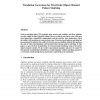Free Online Productivity Tools
i2Speak
i2Symbol
i2OCR
iTex2Img
iWeb2Print
iWeb2Shot
i2Type
iPdf2Split
iPdf2Merge
i2Bopomofo
i2Arabic
i2Style
i2Image
i2PDF
iLatex2Rtf
Sci2ools
116
click to vote
APLAS
2007
ACM
2007
ACM
Translation Correctness for First-Order Object-Oriented Pattern Matching
Pattern matching makes ML programs more concise and readable, and these qualities are also sought in object-oriented settings. However, objects and classes come with open erarchies, extensibility requirements and the need for data abstraction, which all conflict with matching on concrete data types. Extractor-based pattern matching has been proposed to address this conflict. Extractors are user-defined methods that perform the task of value discrimination and deconstruction during pattern matching. In this paper, we give the first formalization of extractor-based matching, using a first-order object-oriented calculus. We give a direct operational semantics and prove it sound. We then present an optimizing translation to a target language without matching, and prove a correctness result stating that an expression is equivalent to its translation.
APLAS 2007 | Extractor-based Matching | Extractor-based Pattern Matching | Pattern Matching | Programming Languages |
Related Content
| Added | 12 Aug 2010 |
| Updated | 12 Aug 2010 |
| Type | Conference |
| Year | 2007 |
| Where | APLAS |
| Authors | Burak Emir, Qin Ma 0002, Martin Odersky |
Comments (0)

